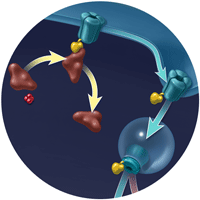 Project Leader:
Project Leader:
Bruce A. Stanton, Ph.D.
Professor, Department of Microbiology and Immunology
Andrew C. Vail Professor
Geisel School of Medicine at Dartmouth
Other Research Team Members:
Britton Goodale, Ph.D.
Tom Hampton, Ph.D.
The Environmental Protection Agency (EPA) and the World Health Organization have identified arsenic as the number one environmental chemical of concern with regard to human health. Arsenic ingestion from contaminated well water in South America, Asia and the United States is associated with increased rates of cancer, heart disease, diabetes, and reproductive and developmental disease. 2.5 million people in the U.S. drink well water containing arsenic that exceeds the level that the EPA considers safe (10 parts per billion) and most Americans are also exposed to arsenic in rice and many rice based products. Epidemiological studies in the U.S. have shown an association between exposure to arsenic in utero and during early childhood to an increased incidence of acute and chronic lung bacterial infections, chronic obstructive pulmonary disease (COPD), and bronchiectasis. However, there is little data showing a cause and effect relationship between arsenic exposure and lung infections.
Accordingly, the goal of our Superfund research project is to determine if very low levels of inorganic arsenic found in well water and organic forms of arsenic in rice and rice based products have adverse effects on the ability of the immune system of the respiratory tract to eliminate bacterial and viral infections. This research is designed to test the hypothesis that levels of arsenic relevant to the U.S. population disrupt the innate immune response of lung cells and immune cells to the bacterial infection.
We anticipate that our studies will address a significant knowledge gap and will provide novel insight into the molecular mechanism(s) whereby very low concentrations of inorganic and organic forms of arsenic affect the innate immune response of the human lung to infection by bacteria, which causes considerable disease and loss of life in the U.S. This new information will be communicated to our communities and stakeholders, including the Food and Drug Administration, as they consider setting standards for arsenic in food.
Publications
Bruce Stanton Pubmed
Other Research
Dartmouth Cystic Fibrosis Research Center website
New Web Application Developed
ScanGEO allows rapid meta-analysis of publicly available gene expression. The application is freely accessible using this link. It was developed by Dartmouth Superfund Program Director Bruce Stanton and Stanton Lab members Britton Goodale, Thomas Hampton, Victoria Holden, Katja Koeppen, and Zhongyou Li. For more information, refer to the Applications Note. Map of ScanGeo Users.